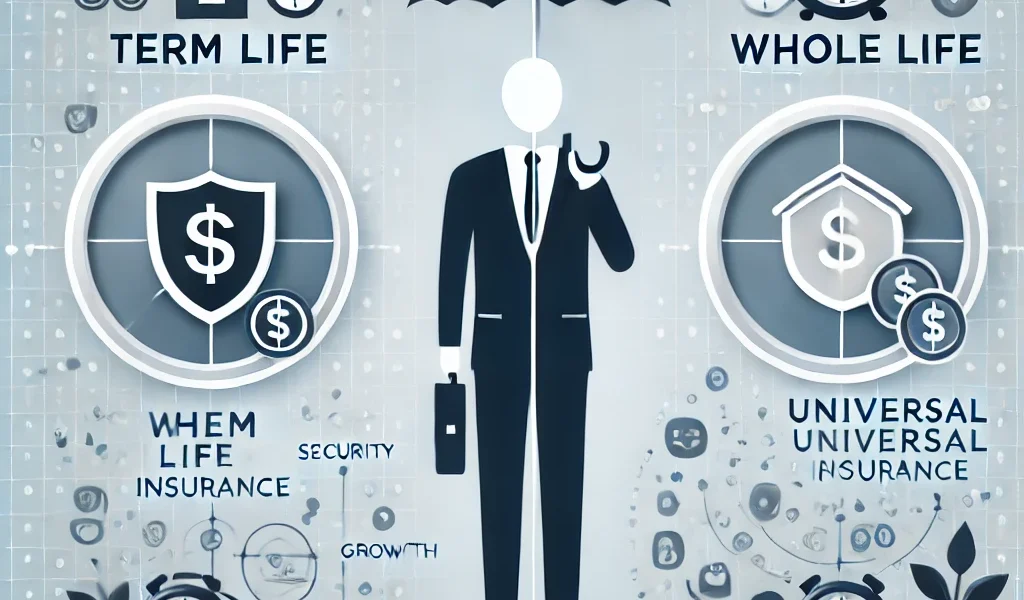Introduction
Life insurance is a crucial financial tool that provides security for your loved ones in case of your passing. However, choosing the right life insurance policy can be confusing with various options available. The three main types of life insurance policies are Term Life, Whole Life, and Universal Life insurance.
In this guide, we will compare these three types of life insurance, breaking down their key features, benefits, and potential drawbacks to help you make an informed decision.
Understanding the Basics of Life Insurance
Before diving into comparisons, let’s briefly define each type of life insurance:
- Term Life Insurance: A policy that provides coverage for a fixed period (e.g., 10, 20, or 30 years) and pays a death benefit if the policyholder dies during that term.
- Whole Life Insurance: A permanent life insurance policy that remains active for the policyholder’s lifetime and includes a cash value component.
- Universal Life Insurance: A flexible permanent policy that combines life coverage with an investment savings element, allowing policyholders to adjust premiums and death benefits.
Key Differences Between Term, Whole, and Universal Life Insurance
1. Coverage Duration
- Term Life: Provides coverage for a set period, such as 10, 20, or 30 years.
- Whole Life: Covers the policyholder for their entire life, as long as premiums are paid.
- Universal Life: Also offers lifetime coverage but with flexible payment and benefit options.
2. Cost & Affordability
- Term Life: Most affordable option, as it only covers a specific period and does not include cash value.
- Whole Life: More expensive due to lifelong coverage and cash value accumulation.
- Universal Life: Generally less expensive than Whole Life but more costly than Term Life due to its investment component.
3. Cash Value Accumulation
- Term Life: No cash value; policy expires without value if not used.
- Whole Life: Builds cash value over time, which can be borrowed against or withdrawn.
- Universal Life: Cash value accumulates, and policyholders can adjust premiums using the cash balance.
4. Flexibility
- Term Life: No flexibility; fixed coverage period and premium.
- Whole Life: Less flexible; fixed premiums and death benefits.
- Universal Life: Highly flexible; can adjust premiums, death benefits, and investment options.
5. Investment Component
- Term Life: No investment or savings component.
- Whole Life: Cash value grows at a guaranteed rate.
- Universal Life: Cash value grows based on market performance, offering greater growth potential but also higher risks.
6. Suitability for Different Individuals
| Policy Type | Best For |
|---|---|
| Term Life | Individuals looking for affordable, temporary coverage, such as young families and those paying off mortgages. |
| Whole Life | Those seeking lifetime coverage with a guaranteed cash value component, such as estate planners. |
| Universal Life | Individuals who want lifetime coverage with flexible payments and investment opportunities. |
Which Life Insurance Policy is Right for You?
Choose Term Life Insurance If:
✔ You need affordable coverage for a specific period. ✔ You want to provide financial security for dependents until major expenses (like a mortgage) are paid off. ✔ You prefer straightforward, no-investment policies.
Choose Whole Life Insurance If:
✔ You want lifetime coverage with guaranteed benefits. ✔ You are interested in accumulating cash value over time. ✔ You need a stable, long-term financial planning tool.
Choose Universal Life Insurance If:
✔ You want flexible premium payments and death benefits. ✔ You are comfortable with investment risks and potential rewards. ✔ You prefer more control over how your policy grows.
Common Mistakes to Avoid When Choosing Life Insurance
❌ Underestimating Coverage Needs – Ensure your policy covers all financial obligations, including debts and future expenses. ❌ Choosing Based on Price Alone – The cheapest policy may not always be the best fit for your needs. ❌ Ignoring Cash Value Potential – Consider whether you need savings or investment features in your policy. ❌ Not Reviewing Your Policy Regularly – Life circumstances change, and so should your policy.
Final Thoughts
Selecting the right life insurance policy depends on your financial goals, budget, and long-term needs. If affordability is a priority, Term Life Insurance is a great choice. If you want lifelong protection with a cash savings feature, Whole Life Insurance may be better. For those seeking flexible premiums and an investment element, Universal Life Insurance is worth considering.
Regardless of which policy you choose, life insurance is a vital part of financial planning that ensures your family’s financial security. Make sure to evaluate your needs and consult with a professional to find the best policy for you.
FAQs
1. Can I convert my Term Life Insurance into a Whole Life policy?
Yes, many insurers allow conversion before the term expires, but the cost may increase.
2. What happens if I stop paying my Whole Life or Universal Life premiums?
Whole Life policies may use the cash value to cover premiums temporarily, while Universal Life policies allow flexible payments.
3. Is Universal Life Insurance better than Whole Life?
It depends on your financial goals. Universal Life offers more flexibility, while Whole Life provides stability.
4. How much life insurance coverage do I need?
A common rule of thumb is to have coverage worth 10-15 times your annual income, but this varies based on individual circumstances.
5. Can I have more than one life insurance policy?
Yes, you can own multiple policies to meet different financial needs.
By carefully considering your options, you can select a life insurance policy that offers the best protection for you and your loved ones.



